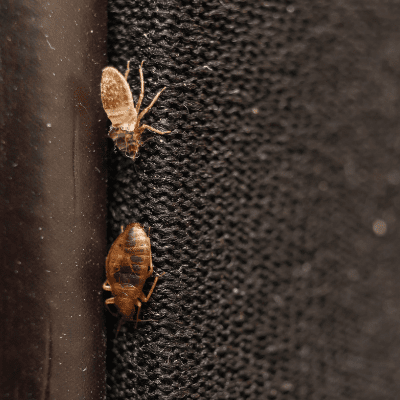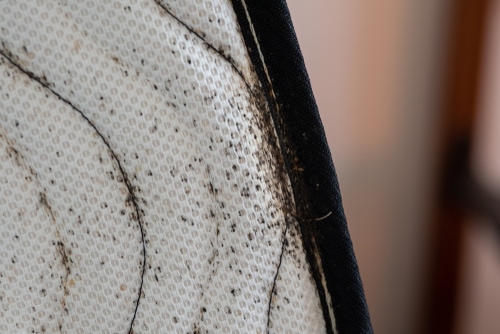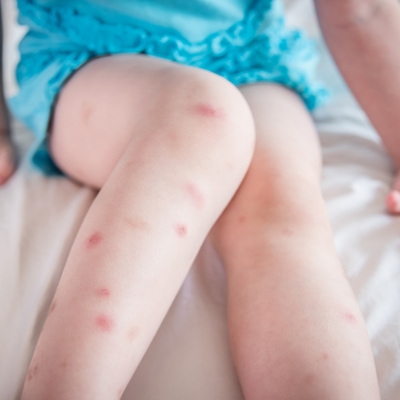These bugs are so notorious, they even have an infamous rhyme dedicated to them: don’t let the bed bugs bite! And bite they will if you don’t take swift action to stop an infestation. Keep reading to learn the most common signs of a bed bug infestation and what to do if you suspect you’ve got them in your home.
7 Signs That Point To A Bed Bug Infestation
1. You See Live Bed Bugs
If you’ve ever wondered, “what do bed bugs look like?” the answer is small reddish-brown bugs with flattened bodies. Adult bed bugs are about 4 – 5 mm in length, but they can be longer after feeding on blood. Their eggs are about 1 mm, making them almost impossible to see unless you look for them. They hide in nooks and crannies and often get confused with other tiny crawling pests like carpet beetles. It’s not common to see live bugs wandering about since they like to remain hidden, but if your infestation is bad, it’s possible to catch them crawling about after dark or if their nests are disturbed. A common way people discover they’ve got bed bugs is when packing to move. Pregnant females tend to move around when pregnant, so it’s possible that if you spot a live bed bug, it could be looking for a place to lay its eggs.
2. You See Shell Casings

While bed bugs themselves are reddish-brown, their discarded shells are yellow-brown and see-through. They vary in size and are discarded as the bugs molt. Since you’re not likely to see the live bugs themselves, discovering their casings is a good indicator you’ve got a bed bug problem. You’re likely to find these shell casings in the same area where bed bugs like to hide, so check the undersides of your mattress, furniture, and along the wall molding near the floor. Bed bugs need to molt several times before they reach adulthood, so the more shell casings you find, the bigger the infestation is.
3. You Find Eggs
As mentioned in sign number 1, bed bug eggs are tiny. Therefore, you’re unlikely to find them without the help of a magnifying glass. They are oval, roughly 1 mm long, and pearlescent white. Like the shell casings, you’ll likely find eggs wherever adult bed bugs like to hide. Momma bed bugs can lay between 1 and 7 eggs a day, and it takes roughly a week to 10 days for those eggs to hatch. And as we touched on in point 1, pregnant females like to wander and look for an ideal location to lay their eggs, which means the infestation could spread, which is why it’s so important not to wait to contact a bed bug exterminator the moment you believe you’ve got bed bugs.
4. You Notice An Unexplained Odor
Like cockroaches, bed bugs give off a musty odor produced by pheromones. This smell is often compared to the smell of mildew, wet laundry, or damp basement. As the infestation grows, the pheromone smell will worsen as it mixes with dead bugs and fecal matter, creating an intense “rusty” odor. Dogs can be trained to detect this odor, even in the early days of an infestation, and alert their handlers, one of the techniques for detecting bed bugs early on.

5. You Notice Tiny Dark Spots On Clothing, Sheets, Or Furniture
When bed bugs poop, their fecal matter stains the fabric of their hiding spot. These stains are roughly the size of a pen tip and often look like permanent marker stains – even after a wash cycle. Fecal marks are difficult to get out because they comprise human blood. That “rusty
” smell we talked about early comes from the accumulation of all the iron in the blood that bed bugs have ingested.
6. You Have Unexplained Bite Marks
The most infamous sign of a bed bug infestation is the bites. You’ll notice them after waking up in the morning since bed bugs are nocturnal. The most common area of the body for bites is on your arms, le

gs, hands, and feet. These bites often appear in clusters and are small, red, and itchy. Unfortunately, red bumps alone are not enough to rule your problem a bed bug infestation. Some people are asymptomatic when it comes to bites – meaning they don’t have any skin reactions at all!
As disgusting as bed bug bites are, there is a bit of silver lining: bed bugs do not transmit diseases like other blood-sucking insects. (Looking at you, fleas and ticks.) However, some people might experience an allergic reaction beyond the red bites. This could look like severe itching, swelling, blistering, or even flu-like symptoms, including fever.
7. You Dark Splotches On Sheets, Clothing, Or Pillows
While bed bug fecal stains look like dots the size of pen tips, the bloodstains they leave behind are more significant. They typically look red or rust-colored and irregularly shaped smears. These stains happen when bed bugs get engorged with blood. If you move in your sleep, you might crush the stuffed bed bug, leaving behind a bloodstain. If you notice what looks like bloodstains, be sure to examine yourself to make sure it’s not the result of some other injury. If you don’t see any cuts or scratches, it might be a sign of a bed bug infestation.
Find Pest Control Near Greensboro, NC
If you’re wondering how to get rid of bed bugs fast, the solution is contacting Cramer Pest Control, Inc. Our bed bug control program will quickly kill off bed bugs in your home – no matter where they’re hiding, no matter if they’re eggs, nymphs, or adults. Let us help you get your home back from these disgusting bugs. If you need bed bug extermination services, don’t wait. Contact us online or call (704) 763-0204 for assistance in North Carolina or (803) 802-7540 for South Carolina customers.
Cramer Pest Control is now a Lookout Partner! To learn more about common signs of bed bugs, bed bug prevention, or to schedule a bed bug treatment – Visit Lookout!
7 Signs Of A Bed Bug Infestation And What To Do About It in North Carolina and South Carolina
Protecting North Carolina and South Carolina
